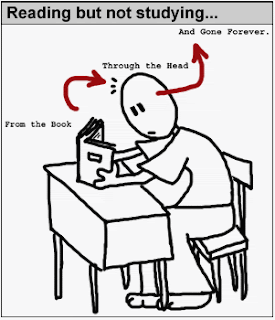
"I've read your book and you have some serious character flaws." Perhaps you've heard this kind of thing before.
Externalization happens when somebody refuses to take words to heart. It is a defense mechanism, indicative of cowardice (perhaps resulting from wounding); a mind that cannot accept correction because it is afraid it will break. That mind has already made an idol of itself: that it cannot rely on any Other but itself. But of course, we need each other.
So when the words come that must be internalized, in advanced cases a thickened membrane has formed over the brain that bounces back the message in the form of an attack on the source, the idea and/or blame laying of the problem to anywhere but self. (N.B. :This too can work in reverse in the "I am to blame because I secretly think that I should be able to do it all" paradigm)
The inward message is also likely to cause offense, because hey, how dare you even suggest that I am wrong? I'm wise after all. I know what's really causing the problem: its you, and that other guy, my boss, my spouse, my girlfriend, my boyfriend, my church, my in laws, my family, my dog, and the bad latte I had this morning.
There are added complications of course. When we unreflectively start blaming other sources for our problems there are inevitable contradictions in our speech. In fact, it starts out as incongruities in our stories, but ends up being externally what it is internally: lying. If we lie to ourselves we will inevitably lie to others simply to avoid the conclusion that there's something wrong with us.
The incongruities I refer to are those things which we blame as the source of ills or possible ills. It is very easy to blame circumstances or states of affairs as the source of problems or failures. For example, one could say that it is harder for a rich man to enter the kingdom of heaven than for a camel to pass through the eye of a needle. Therefore, being rich equals trouble. This kind of thinking will lead one into trouble, because lacking riches, it could be argued sensibly, leads to stealing, marital breakup and other social vices, which also may in turn cost you your soul. In this case of course, I'm not advocating that we all become communists but I am saying that the source of the vice is not actually in the state of affairs, but in humanity itself. (Sorry communism, humanism)
The well adjusted person, perhaps the wise person we might say, is not the one who avoids every manner of circumstance that suggests trouble, but rather is well informed about what pressures situations can bring to bear upon his or her own faulty humanity. This is why proverbs can be antithetical; worldly wisdom is on a hinge, difficult situations swing upon a personality. The person who avoids every circumstance of danger (There is a lion in the street!) we would call a coward or a sluggard. The person who charges into every circumstance of danger we would call a fool. (I'm feeling like Aristotle right now)
Many will call this the virtue of the mean (or whatever those Greeks called it). But we could also call this mediocrity, and beyond that, what exactly determines when to be mean and when not to? (I like being mean. Whats wrong with that?)
Bringing around the discussion back to the unreflective person, you'll easily see now how these various do's and don'ts actually end up being a prison for many people. They not only cower in a self made cage of mediocrity, but they also make statements to different people at different times saying wildly different things. At first they are just incongruities, but if a person wisens up at all to the ludicrous swings of the self-hinge, eventually he will start lying to avoid admitting that he is the gatekeeper.
Now here's the point to really catch I think. In order to venture out into situations that endanger any normal human being in any number of ways (like motherhood, marriage, military or star trek conventions) you must have what the externalizing person does not: internal strength from reliance on an Other. The ability to venture out into danger corresponds to one's concept of personal security. For some people it is sheer delusion, "This will never happen to me" or "love conquers all" or "I have the speed and skills with nunchucks of Chuck Norris", but for everyone it comes down to what one trusts in to keep oneself safe.
There are a whole host of things that can make you feel assured of success, and just as there are many sensible things to avoid, there are many sensible things to remedy the ills. There's just one problem: sensible things aren't eternal things. They are quite literally not eternal because they are just that...sense-able.

I want to suggest, not so subtly, that you don't have to be afraid of anything or anybody if you have a personal eternal crutch. Personally, I am not ashamed to admit that I am so lame I stumble and fall like a drunken manatee when I attempt to walk on my own. I am ashamed however, when I walk out the door without the Crutch, believing I have healed myself.
It's okay though. After I clean up the blood, I remember that after I have suffered the disaster of death, I'll never be lame again.
No comments:
Post a Comment